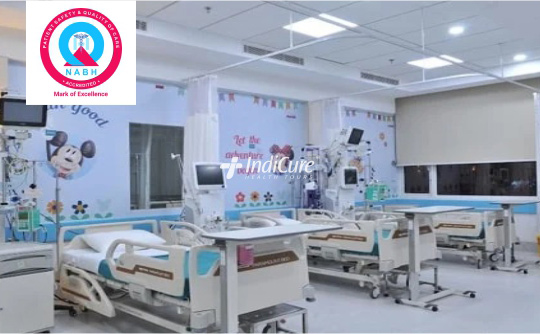

The Cochlear Implant Cost in India starts from USD 13,000 for a single ear. It varies depending on the patient's medical history, the type, make, and brand of the implant, the surgeon, the facility, and the city where you choose to get the surgery done.
The cost quoted above is indicative and should not be taken as the final cost of the surgery. The final cost can be ascertained after our surgeon in India has evaluated the patient. The cost in Indian Rupees can vary based on the exchange rate.
A substantial part of the cochlear implant cost in India comes from the implant itself, with costs varying based on the brand, model, and version. Additionally, whether the patient opts to undergo rehabilitation in India or returns home for continued rehab services also impacts the overall cochlear implant surgery cost in India.
A significant component of the Cochlear implant cost in India is the ENT surgeon's fees. IndiCure recommends highly experienced, skilled, board-certified ENT surgeons who can deliver excellent results. While the charges may vary based on the surgeon's experience, you can be confident that you are in safe and capable hands when opting for a cochlear implant surgery in India with IndiCure Health Tours.
Selecting an accredited medical facility with skilled and qualified medical staff is essential for the success of your cochlear implant surgery in India. Larger cities in India generally provide superior medical facilities and more experienced surgeons, leading to higher costs. IndiCure Health Tours recommends surgical facilities in these larger cities to prioritize quality of care and ensure patient safety.
Surgery-related expenses encompass both pre- and post-surgical costs. Pre-surgical expenses involve determining candidacy and reviewing the patient's medical history, as well as routine exams and tests to ensure suitability for the procedure. Post-surgical expenses may include prescription medications, rehabilitation stays, and follow-up consultations.
At IndiCure, we consolidate most of the expenses for your cochlear implant in India to provide you with an inclusive and cost-effective package tailored to your budget and individual requirements. After receiving medical reports, your case manager will provide an estimated cost based on a discussion with the ENT surgeon.
The final cochlear implant cost in India can however be confirmed after your face-to-face consultation with the ENT surgeon.

We Help you Choose the Right Treatment, Surgeon & Hospital

We Arrange Video/Telephonic Consultation with the Surgeon

We Assist you with Visa & Accommodation

We Receive you at the Airport and Drop you at Hotel/Hospital

We Assist you the at Hospital & Provide Post Operative Support
IndiCure Health Tours offers exclusive savings on your medical travel to India. We partner with select hospitals to negotiate special rates, ensuring you get the best possible cost of cochlear implant in India, when you travel with us.

We at IndiCure completely understand your concerns and it is always our endeavor to provide the best outcome for every patient. Following is the list of questions you must ask before you embark on your journey for a cochlear implant in India.
Prepare to answer questions about your:

A cochlear implant is an electronic device that electronically stimulates the hearing nerve. It enhances hearing when hearing aids do not offer the level of sound clarity required to understand speech and spoken language.
A cochlear Implant is a life-changing option for those who are unable to hear effectively with hearing aids, due to severe hearing loss brought on by inner ear damage.
A cochlear implant bypasses damaged areas of the ear to send sound impulses to the hearing (auditory) nerve, as opposed to hearing aids which only amplify sound.
A Cochlear Implant has two parts- External & Internal
The External portion is located behind the ear. It has a microphone that is used to capture sounds. After processing the sound, it sends it to the implant inside.
During an outpatient procedure, the internal component is positioned behind the skin behind the ear. The cochlea, a component of the inner ear, is reached by a thin wire and a few tiny electrodes. The cochlear nerve receives impulses from the wire and relays them to the brain, where the sound data is processed to create a hearing sensation.
Although normal hearing is not restored, with the right therapy and practice, the improved hearing experience can lead to greater communication through easier lip reading and listening as well as heightened awareness of sounds in the surroundings. An individual with hearing loss may be able to hear and understand speech again or with improved clarity with the aid of a cochlear implant.
A hearing aid is not the same as a cochlear implant. Although a hearing aid increases sound volume, it may not greatly enhance speech comprehension.
A cochlear implant should be taken into consideration when a person finds it difficult to understand speech despite wearing hearing aids. The cochlear implant can greatly improve hearing in adults when the system is tuned properly and the patient is dedicated to rehabilitation therapy. Infants and toddlers with cochlear implants may benefit from listening and language development.
A cochlear implant should be taken into consideration if the development of spoken language is a priority for the family of a young kid with considerable hearing loss.
The care given following the procedure and a long-term commitment from the patient and family to acclimate to the new way of hearing with a cochlear implant are both crucial to a successful cochlear implant surgery. Highly skilled specialists with a focus on hearing and spoken language should deliver weekly auditory rehabilitation. This is crucial in directing rehabilitation toward the intended outcome. This is especially true for young children, who must catch up in their speaking and listening abilities development.
With a cochlear implant, a child's spoken and listening language development is influenced by a number of factors, including:
The family should look for a qualified group that provides a thorough surgical, audiological, and rehabilitation programme that works in conjunction with the family's preferred educational alternatives and institution.
If you have hearing loss and still rely extensively on lipreading, you, your healthcare provider, and an audiologist might think about getting a cochlear implant.
Children under the age of one year who have severe hearing loss in both ears may be candidates for cochlear implants. Cochlear implants may also be given to older kids who have severe hearing loss.
In general, the following people are candidates for cochlear implant surgery:
A partially implanted cochlear implant is used to preserve hearing in cases of more moderate hearing loss such that a hearing aid and the cochlear implant can be worn in the same ear simultaneously.
To completely benefit from electrical hearing, however, a fully placed cochlear implant is required in situations with more severe hearing loss.
Everybody benefits differently from cochlear implants. Four to six weeks following surgery, or when the cochlear implant is turned on, the majority of people see a noticeable improvement in their awareness of sounds. The majority of people see the biggest improvements within the first six months. Speech understanding develops more gradually. Each person experiences this improvement to varying degrees. Auditory, or hearing, therapy following surgery can help with improvements in speech comprehension.
You would be advised to undergo a series of investigations- audiology tests, blood tests, CT, MRI, ECG etc to determine if you would benefit from a cochlear implant and if you are a good candidate for the surgery.
The surgery is done in a hospital setting under general anesthesia and takes anywhere between 2-4 hours.
The surgeon makes a slit behind the ear and the mastoid bone is then opened. After the surgeon locates the facial nerves, he/she opens the cochlea and cuts a gap between them to have access to it.
He or she places the cochlea with the implant electrodes.The receiver, an electronic device, is attached to the skull in this location by the surgeon by placing it under the skin behind the ear.
The surgeon then stitches up the incisions and you are transported into the recovery area and are kept under close observation. After a few hours you are shifted to the hospital room where you would stay for 2-3 days.
You will receive instructions on how to take care of the incisions before leaving the hospital. Additionally, you'll learn how to take care of your stitches and change dressings. After a day or two, you can wash your ears as usual. To check the incisions and remove the stitches, a follow-up visit is scheduled for either at activation or around a week later.
After the initial operation, you will need some time to recover before the implant device is turned on or activated. The external components of the cochlear implant will be added four to six weeks after the operation.
The inside gadget is then programmed and turned on, which prompts it to stimulate the auditory nerve in reaction to sounds.
The fundamentals of utilizing and maintaining the implant will also be covered. For modifications, you might need to come back multiple times over a few days. Over the course of several months, more adjusting will be done. The process of becoming familiar with a cochlear implant is slow. Visits with audiologists and speech-language pathologists will probably be necessary. With dedication, a cochlear implant can help you live a better quality of life.
Cochlear implants have a great success record as medical prostheses. Only 0.2% of recipients reject them, making it a highly successful and acceptable procedure.
Adults gain right away from implant insertion. After the initial tuning sessions, the sound quality keeps getting better for around three months. The children will have to undergo longer rehabilitation to get the best from cochlear implant surgery.
Following a successful procedure and recovery, a person might be able to:
However, it is important to note that cochlear implant surgery results vary from patient to patient. The age at which hearing was lost and the interval between hearing loss and cochlear implant surgery are variables that can impact the success of the procedure.
If a child is born with a profound hearing loss, obtaining a cochlear implant at an early age usually yields the best results.
The best outcomes for adults are typically linked to a shorter time of profound hearing loss prior to cochlear implantation. Although both types of adults generally do better following cochlear implantation, those with little to no familiarity with sound seem to benefit less from them.
Predicted results include:
Improved Hearing: When utilizing the device, many people who meet the requirements for cochlear implantation may gradually experience improved hearing.
Improved Tinnitus: Tinnitus, or ear noise, is not the main reason for receiving a cochlear implant, but while being used, the cochlear implant may partially suppress or lessen the severity of tinnitus.

Delhi
Madhukar Rainbow Children's Hospital is a 150-bed multi-specialty hospital in Malviya Nagar, New Delhi, that was founded in 2018. It is approved by the National Accreditation Board for Hospitals and Healthcare Providers (NABH).
In 2010, "CNBC, TV 18, ICICI Lombard at India HealthCare Awards" named Rainbow Children's Hospital "Best Children's Hospital in the Country". Vice President M. Venkaiah Naidu inaugurated the facility, which is the first standalone pediatric hospital in the NCR that is planned, equipped, and staffed only to treat children and adolescents under one roof.
Madhukar Rainbow Children's Hospital is a 150-bed multi-specialty hospital in Malviya Nagar, New Delhi, that was founded in 2018. It is approved by the NABH.
In 2010, "CNBC, TV 18, ICICI Lombard at India HealthCare Awards" named Rainbow Children's Hospital "Best Children's Hospital in the Country". It is the first standalone pediatric hospital in the NCR that is planned, equipped, and staffed only to treat children and adolescents under one roof.

Mumbai
Fortis Hospital, Mulund is a 300 bedded multispeciality tertiary care facility situated in the centre of the city, offering a range of clinical, diagnostic, and surgical services.
The hospital began operations in 2002 and since then has achieved various milestones. The hospital is a JCI and NABH accredited facility and among very few hospitals to have NABH accreditation for Blood bank and NABL for Pathology Laboratory.
Fortis Hospital, Mulund is a 300-bed multi-specialty tertiary care facility situated in the center of the city, offering a range of clinical, diagnostic, and surgical services.
The hospital began operations in 2002 and since then has achieved various milestones. The hospital is a JCI and NABH-accredited facility and among very few hospitals to have NABH accreditation for Blood Bank and NABL for Pathology Laboratory.
Hearing aids increase the volume of sounds so that the hearing system can better process them. They work well for persons who require louder sounds in order to clearly hear them. The hearing nerve is still reached by sound passing through the outer ear, middle ear, and inner ear. However, for certain individuals, even increasing volume may not be sufficient.
For people with cochlear Implant:
Cochlear implants do not restore normal hearing. However, depending on the wearer, they may aid with word recognition and improved speech comprehension, even when talking on the phone.
It's crucial to understand that the benefits which come with cochlear implant decrease the longer the hearing loss persists. This is especially true for the children. Early intervention is the key. A cochlear implant will benefit the child most if it is provided between 6months to two years of age.
So, if you are debating whether to get a cochlear implant now or wait, it is advisable to see the specialist as soon as possible.
It's critical to understand some facts before considering a cochlear implant. These are:
Cochlear implant surgery is a very safe procedure and the chances of complications are rare. But as with any surgery, there are risks associated with the cochlear implant also, which include infection, bleeding, swelling, injury to nerves, and the risks associated with the anesthesia.
With cochlear implants, there is undoubtedly a wide spectrum of experiences, especially in terms of sound quality. While many people complain that their implants sound "robotic," "distorted," "tinny," or "squeaky," many others claim that their hearing is nice and natural.
For a few days, you can experience mild to severe pain in and around your ear, along with a headache. You might feel lightheaded and hear some popping or clicking in your ears. Within a week, this normally disappears. For roughly three to five weeks, the area behind your ear will be enlarged.
A cochlear implant can significantly enhance a child's capacity to learn to communicate since a child learns a lot about the world through hearing. Adults who have mastered communication but are now unable to hear can also benefit greatly from a cochlear implant.
Most cochlear implant users improve their ability to interpret speech significantly within the first three to six months of use.
No, Cochlear implantation is not an option for everyone. The auditory nerves must be healthy for a cochlear implant to function. When the auditory nerve fiber is damaged or absent, cochlear implants are ineffective.
Cochlear implants do not restore or cure hearing loss, but they do give very hard of hearing or deaf people the chance to hear sound by avoiding the damaged inner ear. They need to be surgically implanted, unlike hearing aids.
In the past, receiving a cochlear implant (CI) implied giving up any remaining hearing. The situation has changed. Many patients are surprised to realize that following cochlear implant surgery, they can still have some residual hearing.
Statistics show that individually, 82.0 percent of people with postlingual hearing loss and 53.4 percent of persons with prelingual hearing loss showed a 15 percentage point or greater improvement in their ability to perceive speech. A tiny percentage either discontinued using the cochlear implant or had worsened ability following implantation.
If the child experienced hearing loss from birth, the sooner the implant is placed, the greater the improvement. The greatest level of benefit is shown in newborns with hearing impairment who receive a cochlear implant before turning two.
The age of implantation is unimportant if the hearing loss is progressive rather than congenital as long as the problem is treated promptly. As long as the patient is in good enough health to undergo surgery, there is no upper age limit for adults who wish to receive a cochlear implant.
Cochlear implants are typically implanted using one of two procedures. Over 40 years have passed since the invention of the conventional implant, often known as a Standard Mastoidectomy. To access the mastoid bone, a cut must be made behind the ear. Access to the middle ear is made possible by opening the mastoid bone. The cochlea is then accessible by opening the inner ear.
Electrodes are introduced through a hole created in the cochlea. At the base of the electrodes, an electrical device is positioned beneath the skin. Most patients leave the hospital the same day after this outpatient procedure, which takes no more than four hours.
A novel, minimally invasive approach for Cochlear implants is becoming more and more popular among surgeons. The technique decreases blood loss, does less damage to nearby tissue, and has a quicker healing period despite being more challenging to learn.
A cochlear implant will not be outgrown by a child. The electrode array is made to allow for growing skulls, and the cochlea is already fully formed at birth.
With a cochlear implant, environmental sound recognition is far less effective than speech recognition. Ambient sound rehabilitation may result in an improvement in the ability to recognise environmental sounds and tell them apart from speech, according to research.
Most kids who undergo cochlear implant surgery stay at the hospital for 1-2 days.
Numerous hospitals in India do cochlear implant surgeries. In India, cochlear and hearing implants are less expensive than in western nations. The type of implant, the surgeon's experience, the hospital type, and the amenities available are only a few of the variables that affect the price of cochlear implant surgery in India. In India, cochlear implant surgery costs begin at USD 13,000. (apprx INR 966,000).
All major brands of cochlear implants are available in India. These include:
They come with the most advanced sound processors available anywhere in the world.
Apart from the cost of cochlear implant and surgical procedure, you would also need to take into consideration the cost of flight to India, cost of hotel stays, food, beverages and cost of local travel in India. You should also keep in mind that there may be some unforeseen expenses related to surgery or otherwise, so you should have some buffer budget to cover such expenses.
Traveling abroad for medical reasons may be challenging. With our experience of over a decade and working with the best surgeons and top hospitals in India, we help make your medical tour easier and safer for you. We will guide you at every step of the way and make end-to-end arrangements for your surgery, travel, and stay.
Ramandeep Dhaliwal
I had great experience having rhinoplasty through Indicure. Dr. Ruchika from Indicure has helped me in finding best plastic surgeon, answering all my questions...
Read More
Joshua Archer
My name is Joshua Archer I'm from New Zealand, bay of plenty, kawerau I opted for the bypass surgery in January 2023 but planned it in advance for 28 September found IndiCure...
Read More
Kera Ren
Absolutely loved my experience with IndiCure - from first inquiring to meeting the surgeon pre op to my follow up post op. The surgeon was extremely approachable...
Read More
Andreana Paul
Had a wonderful experience. Visited India for my plastic surgery. From sending mails, airport pickup, comfortable accommodation and, to smooth hospital appointment booking...
Read More
Brandi Luce
I had the privilege of using Indicure's services for a cosmetic procedure that I had wanted for a long time but had always been apprehensive about. Ruchika helped me...
Read More
Jade M
Indicure Health Tours went above and beyond my expectations. They helped me with every aspect of my journey and were professional, kind and caring. I was...
Read More
The content on the website (www.indicure.com) is intended to be general information and is provided only as a service. All photographs on our website of before and after results are examples only, and do not constitute an implied or any other kind of certainty for the result of surgery.
Learn about IndiCure Health Tours' comprehensive editorial policy that strives to deliver trustworthy, helpful, relevant, accurate and people-first content on medical tourism in India.
It is not medical advice and should not be taken as medical advice. It should not be used to diagnose or treat a health condition and is in no way meant to be a substitute for professional medical care. You are advised to see a surgeon in person to assess what surgery may or may not accomplish for you.
It is also important to keep your expectations realistic and to understand that all surgical procedures carry risks and should never be taken lightly.